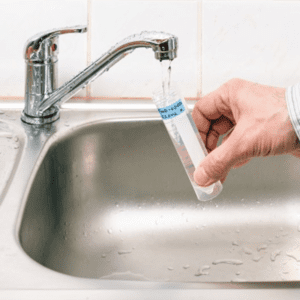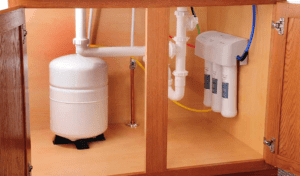Choosing a water softening system for your home might seem like a difficult feat, but it’s not that hard once you get down to it. With the knowledge and guidance of seasoned professionals like us at ACE Home Services, you’ll understand what’s at stake with hard water and exactly what you can do about it. Continue reading to see how to choose water softener systems that meet your needs.
What is Water Hardness?
Hard water has a lot of calcium and magnesium ions dissolved in it. “Hardness” is measured in grains per gallon – grain is a little less than 65 milligrams – or in milligrams per liter. “Softening,” on the other hand, refers to the process of removing the calcium and magnesium ions from your water.
Arizona drinking water is notoriously hard. In fact, a study published in 2016 on the water quality in the Phoenix metro area found that the water hardness ranged from 12 to 18 grains per gallon, which is “very high” according to guidelines from the Water Quality Association and the American Society of Engineers. High to very high hardness water will cause scaling quickly and needs to be softened.
Why Does Water Hardness Matter?
What does that mean for you? Well, because it has so many ions dissolved in it, it’s much harder to clean things with hard water than soft. Hard water will leave a white residue of calcium and magnesium on glass if there’s any water left when you set it out to dry. You even need to use more detergent to clean clothes and dishes and more soap and shampoo when you’re using hard water compared to soft because the soaps interact with the dissolved ions, mainly using them up before they ever get a chance to clean anything.
Even worse, small amounts of these ions precipitate out of the hard water onto the inside of your pipes, heater, and appliances like kettles, coffee makers, dishwashers, and irons over time, forming a mineral coat called “scaling.” Over time, so much scaling will eventually be deposited on your pipes that it affects your water pressure, reduces the efficiency of your water heater, changes the flavor of your tea or coffee, and irons will start to spew out chunks of scaling onto your clothes when you iron them.
How Can I Measure My Water Hardness?

We can help you perform a professional water hardness test that will tell you exactly how hard your water is. Living in the Phoenix area, it’s going to be high. You can also purchase a water test kit online or from a home supply store to do it yourself. The kit should have thorough instructions on how to properly test your water hardness.
What Does a Water Softener Do and How do Water Softeners Work?
Water softeners remove all that dissolved calcium and magnesium. Different types of water softening systems do it by various methods, and there are a couple of main types of water softeners:
- Salt-based ion exchange water softeners: Replace calcium and magnesium with sodium chloride.
- Salt-free ion exchange water softeners: Replace calcium and magnesium with potassium chloride.
- Reverse osmosis water filtration: Removes the chloride from softened water and filters it.
While calcium and magnesium aren’t healthy minerals to have in your diet, don’t worry about removing them – the amount that you’d get from drinking hard water doesn’t add up to nearly as much as you’d get by drinking milk (either standard or vegan milk substitutes) or eating a few vegetables.
Ion Exchange Water Softener in Phoenix, AZ

The dissolved calcium and magnesium found in hard water is ionic – they have an electrical charge because they’re missing electrons. Ion exchange water softening systems remove the ions that cause water hardness by replacing them with “softer” ions, which are ones that won’t cause scaling in your pipes and won’t add an unpleasant flavor to the water. Ion exchange systems pass water through cartridges containing a particular type of resin that releases soft ions into the water and captures the hard ones.
Both salt-based and salt-free ion exchange systems work on this principle. Salt-based ion exchange systems have a resin that contains sodium chloride, the same thing as table salt, which replaces the hard ions with sodium. The ion exchange resin in salt-free systems uses potassium chloride instead of sodium chloride – while potassium chloride is technically a salt, it does not contain sodium and is a preferable choice for people who need to limit their sodium intake or simply prefer to do so.
Reverse Osmosis Water Filtration

Because they switch out sodium or potassium chloride for the magnesium and calcium in hard water, there will be some chloride in your home’s water. If you’re sensitive to the taste of chloride or otherwise would prefer to take it out, you should invest in a reverse osmosis (RO) water filtration system.
RO systems pass water through a fine membrane that removes fine particulate matter, dissolved gases, and even removes the chloride ions introduced by ion exchange water softeners as well as the small amounts of chlorine found in most drinking water that prevents dangerous bacteria from growing in it. The chlorine and chloride in the water isn’t dangerous, but it can give a slightly unpleasant taste to the water that you’d rather get rid of.
Maintaining Water Softeners
As you might imagine, especially when you’re dealing with very hard water like in Arizona, water softening consumes a lot of salt. Whether you have a sodium- or potassium-based water softening system, you’ll have to restore the salt in the resin so that it can continue to exchange ions. Basically, the resin needs to steep in very salty water. The downside is that the salt needs to be very pure – a box of table salt won’t cut it – but fortunately even extremely pure salt is cheap.
The water softening systems we offer can be programmed to regenerate themselves regularly, generally every four days or so. The system’s stock of sodium chloride or potassium chloride will have to be replenished every now and then, which we can do as part of the regular checkups and maintenance that your water softening system should have done anyway. As part of our specials, we perform free service calls and offer discounts on plumbing services, which helps make maintaining your water softener system cost that much less.
Water Softener Repair Services on Short Notice
Even with regular, thorough maintenance, some parts of your system will eventually wear out and need to be repaired or replaced. We’re on call 24/7 for emergency services for repairs to your water systems. In the Arizona summer heat, drinking water isn’t just a matter of convenience; it could very well be a safety issue!
Arizona Water Softener Recommendations By Pros
Bigger isn’t always better when it comes to water softening. Whole-house water softeners in phoenix, az require regular maintenance, which scales with size, and more major water softening systems will be more expensive than smaller ones. So, it’s a good idea to come up with a good estimate for your daily water needs and work from there to determine what kind of water softener you need. You shouldn’t have to spend extra money on capacity that you don’t need, and if cost is a major factor for you, we can even help you finance your water softening and filtration systems.
Whether you need Arizona water softener recommendations by pros or are looking for something that can support a small office, we at ACE Home Services provide top-notch service that brings our skill, experience and specialized equipment to bear. If you already have a home water softener system that needs a checkup or repair or are interested in having a new one installed, don’t hesitate to get in touch with us! We’ll have your system up and running in no time. Contact us today for office and house water softener systems.
